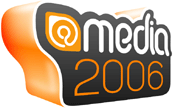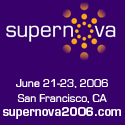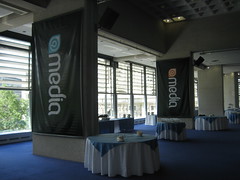projects
recommending
reviewing
events
Subscribe...- June 13 - 15, 2006 Where 2.0 conference - at Fairmont San Jose (u)
-
6/13 7:30pm-8:30pm
-
Geo Microformats BOF II: Developing a 'directions' Microformat
@
Paseo Room, Fairmont Hotel, San Jose, CA
The goal of this BOF is to once again bring together key interested folks in the geo and microformats communities, discuss the work on the directions microformat to date, and brainstorm on proposals for a directions microformat.
-
 6/15-16
@ QEII conference centre, London, UK
(u)
6/15-16
@ QEII conference centre, London, UK
(u)
- 6/18 2pm-6pm - Aimee Mann concert - at Stern Grove (u)
- 6/20 10am-7pm - MashPit @ Wharton School, SF (u)
- 6/20 8pm Microformats.org 1 year anniversary (u)
-
 6/21-23
- at
Wharton West / The Palace Hotel, San Francisco, CA
(u)
6/21-23
- at
Wharton West / The Palace Hotel, San Francisco, CA
(u)
-
6/21 10:30-12:00
-
Supernova 2006 workshop: Decentralizing Data
@
Wharton West Facility, San Francisco
[Moderator: Tantek Çelik (Technorati), Rohit Khare (CommerceNet), Matt Augustine (Microsoft), Brian Dear (EVDB)]
There is a sea change coming in the shift from centralized walled-gardens of data, content, and social-network profiles to a world where the vast majority of such data is decentralized and users have far more control and ownership over their own data. These changes will impact nearly every site on the web as we know it.
- 6/23-25 - BarCamp San Francisco - at TBD (u)
- 7/10-11 An Event Apart NYC - at Scandinavia House, NYC
- 10/9-11 CSS WG f2f - at Mozilla Corporation, Mountain View
Posts
Supernova Workshop: Decentralizing Data
- created
- 6/30 11:59 PM
- content
tags:
Last week I had the honor of moderating the "Decentralizing Data" workshop at Supernova 2006 which took place just one year and one day after we launched microformats.org. Suffice it to say that I was humbled by both the quality of the panelists, and the magnitude of their announcements. This brief summary blogged late at night only scratches the surface. If you were there, please find and note/tag yourself in the photos of the workshop audience.
The presentations and announcements:
- Kevin Lawver of AOL: Decentralized Data: AIM Pages - My Favorite AIM Pages Feature launched!
- Rohit Khare of Commercenet
- Brian Dear of EVDB - Brian announced that EVDB hosts and publishes over one million events in the hCalendar microformat, and that EVDB is working on an hCalendar validator.
- Tantek Çelik of Technorati: Decentralizing Data
- Matt Kaufman of Edgeio: Distributed Marketplaces - announcements:
- Matt Augustine of Microsoft - Check out the screencast of Live Clipboard and SSE
- Andy Baio of Yahoo! - Yahoo! Local fully supports the hCalendar, hCard, and hReview microformats - over 15 million new microformatted chunks now on the Web.
See Dan Farber's excellent article:Yahoo Local joins the microformat revolution as well as the Red Herring coverage. Related articles and posts alphabetical by author (let me know if I'm missing yours)
- Baher Al Hakim
- Assaf Arkin
- Alex Barnett
- Ben Barren
- Michael Biven
- Stowe Boyd
- Eydie Cubarrubia
- Chad Dickerson
- Dan Farber
- Darlene Fichter
- Jay Goldman
- Steve Hall
- Christine Herron (2)
- Joe Hunkins
- Matthew Hurst
- Niall Kennedy
- Richard MacManus
- Chris Messina
- Randy Charles Morin
- Liam Morrison
- Greg Narain
- Tim O'Reilly
- Jeremiah Owyang
- Pasquale Popolizio
- Pete Prodoehl
- Paul Scrivens
- Temple
- Phil Windley
- Jeremy Zawodny
Video coverage and interviews:
- Blip TV clip of Decentralizing Data workshop
- CNET News.com with Andy Baio
- Supernova Video: David Weinberger interviews Rohit Khare and Tantek Çelik.
That's it for now. I'm still digesting the firehose of interaction that was BarCampSanFrancisco and will be following up on that. For now, see Tara's opening post, and Chris's closing post.
- Comments

More June Flickr Sets
- created
- 6/30 11:40 PM
- content
tags:
Rounding out the photos from @media:
Upon returning to the U.S. Chris and Tara graciously picked me up from the SFO International Terminal and drove me straight to Stern Grove:
- Stern Grove, June 18th, 2006 where we saw Aimee Mann and snacked on strawberries and Nutella.
- Monday evening we held a final BarCamp San Francisco planning meeting.
- Microformats.org one year anniversary party at 111 Minna on Tuesday night was a blast. See everyone else's photos. It was crowded. See if you can find, note and tag yourself in Enric's crowd photo. Did you get a microformats tshirt?
- The Decentralizing Data workshop at Supernova 2006 , audience in particular. Were you there to witness a mix of companies big (AOL, Microsoft, Yahoo) and small (Commercenet, Edgeio, EVDB, Technorati) give lightning talks and demonstrations of microformats support in their currently live on the Web tools and services? Note and tag yourself in the photos!
- Supernova 2006 Technology Showcase later that day
- Supernova Connected Innovators Showcase including this awesome slide with IE5Mac in the OSX dock the next afternoon.
- Supernova Evening Networking Gala with plenty of shiny happy people.
- John Garstka presentation (from the "Office of Force Transformation, US Dept. of Defense")
- Boca Java special coffee blends for bloggers.
- John Garstka himself along with a suited gentleman who wasn't excited about being photographed.
- Werner Vogels's presentation titled "Dial Tone Your Web Business". Suffice it to say Werner knows a thing or two about scaling.
- Bradley Horowitz's Supernova presentation where I made use of my camera's multishot feature for the first time to capture all his examples of "interesting" Flickr photos. If anybody can find the originals, please link to them with a comment on mine.
- In between those sets there are plenty of other Supernova 2006 photos of people connecting in the hallways, between sessions, etc.
- BarCampSanFrancisco began shortly after Supernova 2006 ended. See everyone's BarCampSanFrancisco photos.
- Comments

Podcast on archives, persistence, longevity, open data formats
- created
- 6/19 3:47 PM
- content
tags:
Last September I gave a fairly long talk on microformats at Web Essentials 05. I'm bringing this up now because the first 20 minutes or so of the session were all about archives, persistence, longevity, open data formats, and even touch on email migration (problems with which were
the last straw
for Mark Pilgrim). Yes, as I said, these have been driving motivations for microformats for some time. Here is the MP3 of the session (which should show up as a podcast for those of you subscribed to my updates feed). Let me know if this works in your podcast client!- Comments

- Conor O’Neill
Conor, it sounds like Juice needs to be upgraded to fully support Atom 1.0, including rel-enclosure. Note that iTunes v6 had no problems picking it up.
- Navarik
- Conor O’Neill
- Conor O’Neill
Another @media set: massive group dinner
- created
- 6/19 10:37 AM
- content
tags:
Latest set of photos is from dinner post conference that started with 30 people meeting in the lobby of the Crowne Plaza and wandering over, but grew to many more than that. Everyone had a great time as you can tell.
- Comments

Open data formats, longevity, and microformats
- created
- 6/17 10:31 PM
- content
tags:
The topics of openness in data formats, data fidelity over time, and data recoverability have recently flared up in the web tech blogosphere.
All of these are major reasons why I decided that microformats were worth pursuing, and the time for them had come. Let me rewind a bit.
- ASCII is dependable. Project Gutenberg insists on publishing their e-books as plain ASCII text as Mark Pilgrim noted, and their reasons are solid.
- Compatible XHTML is now also dependable. In the 15+ years since its public introduction, I believe that HTML has established itself sufficiently prominently worldwide that I feel quite comfortable declaring that HTML will be accepted to be as reliable as ASCII in coming years. In particular, authoring what I like to call Compatible XHTML, that is, valid XHTML 1.0 strict that conforms to Appendix C, is IMHO the way to author HTML that will have longevity as good as ASCII. Note that files in most file systems have no sense of "MIME-type", thus the winged-mythological-creatures-on-the-head-of-a-pin style arguments about
text/htmlvs.application/xhtml+xmlthat are often used to discredit either HTML or XHTML (or both) are irrelevant for the most common case of keeping archives of files in file systems. - Plain old XML (POX) formats in the long run are no better than proprietary binary formats. XML, both in technology and as a "technical culture" is too biased towards Tower of Babel outcomes. I've spoken on this many times, but in short, the culture surrounding XML, especially the unquestioned faith in namespaces and misplaced assumed requirement thereof, leads to (has already lead to) Tower of Babel style interoperability failures. As this is a cultural bias (whether intentional or not) built into the very foundations of XML, I don't think it can be saved. There may be a few XML formats that survive and converge sufficiently to be dependable (maybe RSS, maybe Atom), but for now XHTML is IMHO the only longerm reliable XML format, and that has more to do with it being based on HTML than it being XML.
- Formats that are smaller (e.g. define fewer terms) tend to be more reliable.
- Formats that are simpler (e.g. define fewer restrictions/rules for publishers) tend to be more reliable.
- Formats that are more compatible with existing reliable formats tend to be more reliable, e.g. HTML worked well with existing systems that supported "plain text" (AKA ASCII)
- Formats that are easier to use, i.e. publish, and more immediately useful, rapidly become widely adopted, and thus become reliable as a breadth of software and services catches up with a breadth of published data in those formats.
The microformats principles were based on these observations.
Now this doesn't mean I think microformats will replace existing reliable formats. Not at all. For example, I feel quite confident storing files in the following formats:
- ASCII / "plain text" / .txt / (UTF8 only if necessary)
- mbox
- (X)HTML
- JPEG
- PNG
- WAV
- MP3
- MPEG
For persistent storage of more semantic information, (X)HTML provides us with excellent buliding blocks above and beyond ASCII or UTF8. It is however insufficient to convey many other common text-based chunks of information which are worthy of saving such as contact information, events, and reviews.
Microformats from the beginning in my mind are serving two very important purposes.
- Microformats provide simple ways of identifying larger chunks of information on the Web for easily and immediately publishing, sharing, moving, aggregating, and republishing.
- Microformats are perhaps a step forward in providing building blocks for the longevity of higher fidelity information as well.
As a result of achieving (1), I believe microformats will also achieve (2). Perhaps 15 years from now it will be obvious whether or not microformats have become as reliable as HTML, or ASCII for that matter.
Thanks to Mark Pilgrim, Tim Bray, and Jeremy Zawodny for their excellent posts and sharing of personal experiences with data formats, both good and bad which very much inspired this post.
- Comments

- John Gruber
John, note that I said:
ASCII / "plain text" / .txt / (UTF8 only if necessary)
(emphasis added). - Colin D. Devroe
- Jesse Skinner
- Chris Gervais
- Rijk van Geijtenbeek
- Dave B
- Michele Campeotto
- Conor O’Neill
- Navarik
- Duncan Cragg
- Bill de hÓra
- Peter Chng
- John Gruber
@media 2006 photos and note yourself!
- created
- 6/17 9:24 PM
- content
tags:
 I'm in the middle of uploading photos from @media 2006. Here are a few "sets" in time order:
I'm in the middle of uploading photos from @media 2006. Here are a few "sets" in time order:
- @media day1 - having just flown in that morning, I was a bit slow to take photos, thus some sessions are sparse or missing altogether.
- Westminster Abbey on a beautiful day in London.
- Dinner at Mango Tree. Much thanks to Ryan Carson (of Carson Workshops).
- @media conference party
- Microformats: Evolving the Web audience - if you find yourself, please add a note with your name linking to your blog or home page!
More coming up.... Watch along at my Flickr stream.
- Comments

Microformats Evolving the Web at @media
- created
- 6/16 4:25 PM
- content
tags:
 The @media conference sessions wrapped up today. Here are the slides from my presentation: "Microformats: Evolving the Web" that I gave earlier today. Some material from earlier presentations, but a bunch of new material as well. Here are a few early reports and reviews:
The @media conference sessions wrapped up today. Here are the slides from my presentation: "Microformats: Evolving the Web" that I gave earlier today. Some material from earlier presentations, but a bunch of new material as well. Here are a few early reports and reviews:
- Garrett Murray
- Jared Smith
- Matthew Hutchinson
- Stephen Stewart
- Rémi Prévost
- Matthew Pennell
- Rachel Andrew
Held immediately after my talk, the "Hot Topics" closing panel was a lot fun as well. Stuart provides a nice summary.
Overall @media was a blast. Needed wifi and powerstrips though! ★★★★☆
Jun 16, 2006 by TantekThe @media conference was run extremely well. Microphones all worked. Sessions started promptly and on time. And the sessions I attended were all quite good. My only complaints were the pretty much non-functional network, and the lack of everpresent powerstrips. I must be getting spoiled by O'Reilly conferences. In any case I had a blast both on stage and off. Meeting and talking with many folks was perhaps the best part. The quality of attendees was extremely high. Great questions too. It was wonderful meeting so many smart web designers and developers who previously I had only corresponded (or Flickrd) with. XFN metroll to follow.
- Comments

- Related
- Jeremy Keith
- Bruce Hadden
- Caroline Umali
- Martin Sutherland
- Glenn Jones
- Adam Liptrot
- Dan Atrill
- Veerle Pieters
- Ben Holliday
- Chris Jennings
- James Aylett
- Paul Robert Lloyd
- Matt Machell
- Ben Ward
- Aperto
- Wheelz
- bloggED
- Ivo Gomes
- Luis Villa
- Christopher Murphy
- Luis Villa
- Paul Boag (podcast)
- Mark Hadley
- James Greig
- Emma Sax
Microformats Search updated with add and subscribe
- created
- 6/14 11:02 PM
- content
tags:
Two weeks since we introduced Microformats Search and it's about time we added a few minor features.
John Panzer wrote and asked for the ability to add contacts and events to his local address book and calendar. Now you can.
On the left of each Contacts Search and Events Search result, you'll see a little grey button with a plus ("+") sign on it which turns green when you hover over it and provides an explanatory tooltip.

Clicking it will download a vCard (.vcf) or iCalendar (.ics) file and open up in your address book or calendaring program, respectively.

Several calendar programs (iCal.app, Mozilla Sunbird, Evolution) also support the ability to subscribe to events feeds as well, and thus on Events Search results, right next to the "add" button there is a small grey button with a couple of ripples on it which turns orange when you hover over it and provides an explanatory tooltip.

Clicking it will launch your calendar program and provide it a http://feeds.technorati.com/event/ URL that automatically converts hCalendar events to iCalendar events for easy subscription by your calendar program.
These features were of course built with the Technorati Contacts Feed Service and Events Feed Service that were introduced at the Syndicate conference last December. The services themselves use Brian Suda's excellent X2V XSLT transforms.
And with that I must be going since they just asked us to shut down all electronic devices here on my flight to London for the @media conference.
- Comments

Microformats Search and Pingerati Update
- created
- 6/9 7:27 AM
- content
tags:
It has been just over a week since we launched Microformats Search. We've averaged about 100,000 microformat updates per day in our first week. Note that those are total updates of individual hCards, hCalendar events, hReviews, etc. rather than pages/URLs. In addition, since we launched Pingerati, several sites have been pinging it with microformats updates. In particular Yahoo! Tech, which publishes all reviews in hReview, has started sending a few review updates. In addition, we've been seeing a lot of individuals pinging with their Flickr profiles, as those are marked up with hCard.
If you're using a service that publishes with microformats, try pinging Pingerati with the URLs of your pages, and then searching for your info to see if it works. It's really easy, e.g. this URL sends an update ping of my Flickr profile:
http://pingerati.net/ping/flickr.com/people/tantek
If you have a Flickr profile, try it! In addition, any time you post an event on Upcoming, or a review on Yahoo! Tech, or any of the other sites and services that support microformats, ping the URL with Pingerati.net. You may want to add the handy Ping This! favelet to your browser toolbar to make it one-click easy to ping any page.
Right now we're indexing microformat updates in anywhere from a few seconds (yes, that fast) to about a minute, so be patient if you don't see your info show up instantly.
If you have any questions about microformats, want to learn more about writing and supporting them yourself, or are just curious, check out the microformats.org mailing lists and irc channel.
- Comments

Before Microformats Search There Was Microformat Base, Ruby Microformat Parser, and X2V
- created
- 6/1 12:52 PM
- content
tags:
Mea culpa. As I knew I would, I forgot to mention some efforts (as is inevitable when mentioning a long list of great folks and services), in particular the great work that Scott Reynen has done with Microformat Base, and he appropriately chided me for it.
Apologies to Scott. I'm making sure he gets the proper recognition.
Almost exactly six months ago Scott launched Microformat Base, an
attempt at a microformat-based alternative to Google Base. It[Microformat Base] is slowly crawling the web looking for microformatted content, and adding it to a structured database, searchable by microformat class names.
.The existence and functionality of Microformat Base made several very important statements:
- Google's approach of building a walled-garden/roach-motel Google Base that no one else could index was completely unnecessary, and, one might even say a somewhat (even if unintentional) evil effort to control users' data.
- There was no reason for Google to invent their own proprietary formats for structured data, when open community efforts were delivering much better results than any closed single-corporation attempt could. And no, a folkschema (arbitrary property/value pairs) is not a format, it's a recipe for Babel.
One person, Scott Reynen, demonstrated this in his spare time. Not a startup, not a major competitor. An individual.
Companies take note - on the internet, there will always be smarter, more clever people building on each other's work than your secret internal committees, your architecture councils, your internal discussion forums -- no matter how many supergeniuses you think you may have hired away and locked up with golden shackles in your labs. Either play open or expect your proprietary formats and protocols to be obsolete before they've even seen the light of day.
A few large companies have taken at least some note (and delivered) -- none other than AOL (AIM Pages), Microsoft (Live Clipboard), and of course Yahoo (Yahoo! Tech, Yahoo! UK Movie Reviews, and of course their fledgling darling acquisitions Flickr and Upcoming.org which by the way was the first major event site to support hCalendar last May when microformats.org itself was merely twinkles in the eyes of the microformats community).
As if a demonstration wasn't enough, Scott released his work as open source so that anyone could host their own Microformat Base, or build upon it and make something else (if I had remembered his work I might have been able to get my code finished for Microformats Search much sooner, but since I forgot this was there, I ended up writing all my own code from scratch. Ah well, I have a feeling much of my code will be rewritten anyway ;)
Scott's early work with demonstrating support for parsing and indexing microformats provided a much needed proof of concept that more general microformats parsing was possible, and not that difficult - you can view the source for yourself. Scott even called out both Ryan King and myself in his blog post when he suggested that perhaps an existing web crawler could do something like this to enhance its results. And here we are six months later with Technorati Microformats Search.
While calling out this earlier work, I want also mention that just 10 days before Scott announced Microformat Base, Assaf Arkin released his open source Ruby Microformat Parser on RubyForge with official documentation etc.
By providing a nice fielded search user interface however, Microformat Base let you try pinging it and searching for microformats by specific properties right away, thus enccouraging folks to publish their content with microformats and see them get indexed.
Both PHP and Ruby parsers were warmly welcomed in the microformats community, since until then, Brian Suda's X2V XSLT+PHP for turning hCards into vCards and hCalendar into iCalendar was one of the few open source demonstrations of microformat parsing, and was very much tailored to handle those two microformats in particular.
All this distributed development and effort is what makes the microformats community a community, rather than just another self-proclaimed community/initiative website with a wiki and blog. There are a lot of smart people out there, coming up with great ideas, working together, and building things with microformats. My hats are off to them, to Brian, Assaf, Scott, and everyone else who has written code that supports microformats, it is their work that everyone who works with microformats has benefitted from, and that is enabling the growing ecosystem of open structured data on the Web.
- Comments







